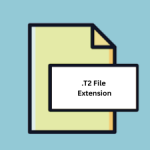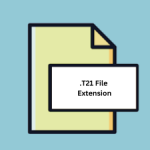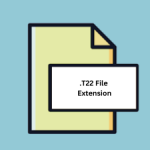.MBSA File Extension

Microsoft Baseline Security Analyzer File
| Developer | Microsoft |
| Popularity | |
| Category | Data Files |
| Format | .MBSA |
| Cross Platform | Update Soon |
What is an MBSA file?
The .MBSA file extension denotes files generated by the Microsoft Baseline Security Analyzer. These files encapsulate the results of security scans conducted by the MBSA tool, providing comprehensive insights into the security posture of a Windows system.
Typically, .MBSA files serve as reports, cataloging various security aspects such as missing updates, weak passwords, or misconfigured settings, allowing administrators to identify and rectify vulnerabilities efficiently.
More Information.
Microsoft Baseline Security Analyzer debuted in the early 2000s, aligning with Microsoft’s commitment to bolstering security measures across its ecosystem.
Initially released as a standalone tool, MBSA evolved, incorporating enhancements and updates to adapt to the evolving threat landscape.
The primary purpose of MBSA has always been to streamline the process of security assessment, providing administrators with actionable insights to fortify their systems against potential cyber threats.
Origin Of This File.
The origin of the .MBSA file extension traces back to the development of the Microsoft Baseline Security Analyzer tool itself.
Microsoft introduced MBSA to assist system administrators in evaluating the security configurations of Windows operating systems and other Microsoft software.
With the rising concerns surrounding cybersecurity and the need for robust defense mechanisms, MBSA emerged as a pivotal solution, empowering administrators to enhance the security posture of their systems.
File Structure Technical Specification.
The structure of .MBSA files adhere to a specific format designed to encapsulate the results of security scans comprehensively. These files typically contain detailed information regarding various aspects of system security, including but not limited to:
- Security updates status
- Password policies compliance
- Registry settings
- Security configurations
- System vulnerabilities
The technical specifications of .MBSA files may vary slightly depending on the version of the Microsoft Baseline Security Analyzer used to generate them. However, they commonly feature a structured format, often utilizing XML or similar markup languages to organize and present the scan results systematically.
How to Convert the File?
Converting .MBSA files to other formats may be necessary for integrating scan results into existing tools or platforms. While direct conversion methods may not be readily available due to their proprietary nature of .MBSA files, alternative approaches can be employed.
One such method involves parsing the contents of .MBSA files and transforming them into a compatible format using scripting or programming languages. Below are steps to convert .MBSA files:
- Parsing .MBSA File Contents: Before conversion, it’s essential to parse the contents of the .MBSA file to extract relevant information such as security vulnerabilities, configuration issues, and scan results. This can be achieved using programming languages like Python, PowerShell, or specialized XML parsing tools.
- Identifying Target Format: Determine the desired format for conversion based on the requirements of the target system or tool. Common formats for security scan results include CSV (Comma-Separated Values), JSON (JavaScript Object Notation), HTML (Hypertext Markup Language), or custom formats specific to proprietary tools.
- Developing Conversion Script: Create a conversion script or program that processes the parsed .MBSA file data and transforms it into the target format. Depending on the complexity of the conversion, this may involve mapping fields, formatting data, and handling errors or exceptions.
- Testing and Validation: Test the conversion script rigorously to ensure accuracy and completeness of the converted data. Validate the converted output against sample .MBSA files to verify consistency and integrity.
- Refinement and Optimization: Refine the conversion script based on feedback and testing results. Optimize performance and resource utilization to ensure efficient processing of large .MBSA files.
- Documentation and Maintenance: Document the conversion process, including input/output formats, dependencies, and usage instructions. Maintain the conversion script regularly to accommodate changes in .MBSA file structure or target formats.
- Integration with Workflow: Integrate the conversion script into existing workflows or automation pipelines to streamline the process of converting .MBSA files and incorporating scan results into security management systems or reporting tools.
By following these steps, administrators can effectively convert .MBSA files into a compatible format for further analysis, reporting, or integration with other systems.
Advantages And Disadvantages.
Advantages:
- Comprehensive Assessment: .MBSA files provide a comprehensive overview of security vulnerabilities and configuration issues within Windows systems, enabling administrators to address them proactively.
- Standardized Reporting: The structured format of .MBSA files ensure standardized reporting, facilitating clear communication of security findings across organizations.
- Streamlined Remediation: By identifying security weaknesses, .MBSA files expedite the remediation process, allowing administrators to prioritize and address critical issues promptly.
Disadvantages:
- Dependency on MBSA Tool: .MBSA files are generated exclusively by the Microsoft Baseline Security Analyzer tool, necessitating its availability for conducting security scans and generating reports.
- Lack of Cross-Platform Support: As MBSA primarily targets Windows systems, .MBSA files may not be compatible with other operating systems, limiting their utility in heterogeneous environments.
How to Open MBSA?
Open In Windows
- Use Microsoft Baseline Security Analyzer: .MBSA files can be opened directly using the Microsoft Baseline Security Analyzer tool on Windows systems. Install MBSA and open the .MBSA file within the application to view the scan results.
- Third-Party XML Editors: Alternatively, .MBSA files can be opened using third-party XML editors or viewers available for Windows. These tools allow users to inspect and manipulate the XML structure of the .MBSA file.
Open In Linux
- Wine: Install Wine, a compatibility layer for running Windows applications on Linux, and then run Microsoft Baseline Security Analyzer using Wine to open .MBSA files.
- Virtualization: Use virtualization software such as VirtualBox or VMware to create a Windows virtual machine on Linux. Install Microsoft Baseline Security Analyzer within the virtual machine to open .MBSA files.
Open In MAC
- Wine or CrossOver: Similar to Linux, macOS users can utilize Wine or CrossOver (a commercial implementation of Wine) to run Microsoft Baseline Security Analyzer and open .MBSA files.
- Virtualization: Employ virtualization software like Parallels Desktop or VMware Fusion to create a Windows virtual machine on macOS. Install MBSA within the virtual environment to access .MBSA files.













